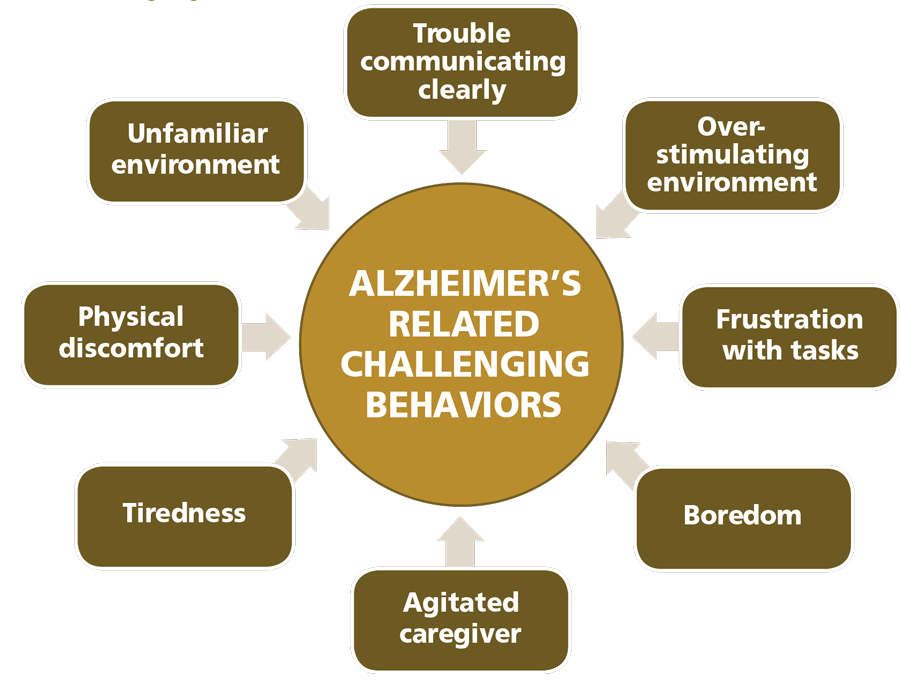Common Causes and Supportive Responses for Alzheimer’s-Related Behaviors
Especially with middle to late stage Alzheimer’s, oftentimes a person cannot express how he or she feels with words and instead communicates feelings through some common dementia behaviors. Successfully dealing with challenging dementia behaviors in persons with Alzheimer’s disease begins by:
- Identifying the cause of the behavior or “trigger”. Questions to think about are:
- What happened just before the behavior started?
- Where did the behavior happen?
- What happened right after the behavior?
- Reacting calmly and reassuringly.
- And then modifying the environment or caregiving style to reduce potential stressors that can create agitation and disorientation.
Causes of Challenging Dementia Behaviors
Trouble Communicating Clearly
Effect: A person with Alzheimer’s may become agitated if she cannot figure out what you are trying to tell her to do or can’t find the right words to tell you what she wants. What you see are actions that cry out the emotions that person is feeling.
Also, the person with Alzheimer’s may use incorrect words for an object or may say repeatedly that she needs to go home, even if she is home. To her, “home” may not really be a place, but represents the feeling of safety.
Response: Respond to the emotion that is being communicated rather than the behavior. When giving instructions, break down what you are asking into one simple step at a time.
Unfamiliar Environment
Effect: A move to a different care environment, changing caregivers, or being in a location the person is unable to recognize can cause troubling behaviors. She may act nervous and upset. She may pick at her clothes, wring her hands, cry, create accusations or choose repetitive behavior or words. The repetitive behavior or words may be a way the person is looking for security and familiarity.
Response: Do not try to reason or correct. Listen to what is troubling the person and try to understand her reality. Be reassuring and let her know you care, that she is safe and that you will stay with her until she feels better. Offer to find whatever was lost if there is an accusation of theft. Repeat an answer if a question is asked again or try distraction to a different activity or topic.
Over-Stimulating Environment
Effect: Too many people, too much noise, garish colors in the environment, shadowy rooms or excessive clutter can lead to agitation, hallucinations or aggressive behavior.
Response: Stay calm and stay an arm’s length away if safety is a concern. Provide reassurance and encourage the person to go with you to another place where it is well lit, quiet and calming. Be sensitive to the feelings that may be causing the behavior, such as fear or worry.
Physical Discomfort
Effect: Physical discomfort may come about due to illness, medication side effects or other factors, but the person with Alzheimer’s may not be able to communicate clearly about her discomfort and may try to get the message across through her behavior.
Response: Check for pain, hunger, thirst, constipation, full bladder or tiredness. Also check to see if her clothes may be too tight or too loose. If medication side effects are the suspected cause of discomfort, contact the physician.
Frustration with Tasks
Effect: When trying to accomplish a task or chore that has multiple steps or seems complicated to the person with Alzheimer’s, strong reactions can occur.
Response: Stay calm and be patient. Repeat instructions one step at a time. Say statements such as, “Do as much as you can and I will help you.” If trouble continues, do not persist in making the person perform the task, but rather move on to a different activity.
Tiredness
Effect: Agitation, fear, repetitive behaviors and many other troubling yet typical behaviors associated with Alzheimer’s can occur when a person is feeling run-down and tired.
Response: Use a quiet tone of voice and encourage some rest time.
Boredom
Effect: A person may choose repetitive behaviors if she is bored or under-stimulated.
Response: Turn a repetitive action or behavior into an activity. For example, if she is rubbing her hand across the table, give her a cloth and ask her to help with dusting. Other simple tasks that can help a person feel useful are winding a ball of yarn or stacking magazines. Try using art, music or touch to help her relax. Pull out a memory book or treasure box you have made together. Use the pictures or items to talk about good memories. Take a walk, play ball or go for a car ride.
Agitated Caregiver
Effect: Getting anxious or upset in response to a problem behavior can increase the level of stress or agitation in a person with Alzheimer’s.
Response: Respond to the emotion being communicated by the behavior, not the behavior itself. Try to remain flexible, patient, and relaxed. Remember, the person is responding to your tone of voice and body language more than the content of what you’re saying. If you find yourself becoming anxious or losing control, take a time-out to quickly relieve stress.
After Challenging Dementia Behaviors Have Passed
Reflect on how you handled the situation and if anything should be done differently next time. Keep track of your answers each time you see the behavior. These are clues that you can use to help make your caregiving easier. If you can change or prevent the triggers, you may be able to keep the behavior from happening in the same way again.
Hired Hands Homecare walks hand in hand with families through the progression of their loved one’s disease, offering professional, compassionate services for dementia care in Santa Rosa, Novato, Pleasanton, Napa, Sonoma, or the surrounding areas. Contact Hired Hands Homecare to learn if your clients or loved ones could be a good fit for our specialized in-home Alzheimer’s and dementia care services.
Sources: Alzheimer’s Association: “Living with Alzheimer’s”, Coach Broyle’s Playbook for Alzheimer’s Caregivers, HelpGuide.org
Click here to download a printable PDF version of this page.







